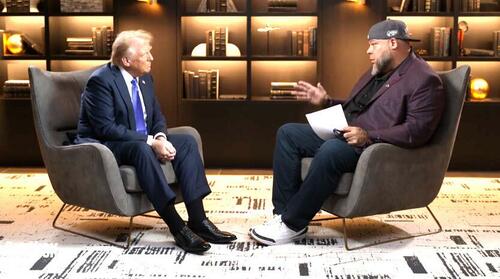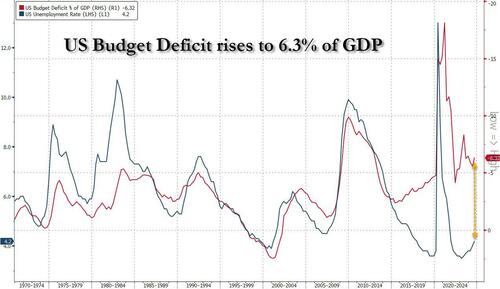
The race to shock and awe with the greatest number of tax cuts ahead of the November 5 election is nearing its climax.
Donald Trump said he’d consider exempting police officers, firefighters, active duty military and veterans from paying taxes, the Republican nominee’s latest campaign trail idea to deliver tax breaks to key groups of supporters.
“It’s something I would think about,” Trump said in response to a question about excluding first responders and military members from tax bills on an online show Maintaining with Tyrus that aired Friday.
“You’re like my tax person there, but yeah. I mean something has to be done,” he said. “It’s almost an incentive to where you can get people interested.”
The idea to exempt members of the military and first responders from taxation is the latest in a long list of tax proposals Trump has talked about while campaigning against Kamala Harris. He’s pledged to i) eliminate taxes on tipped wages, ii) taxes on overtime pay and iii) taxes on Social Security benefits.
To be sure, Trump didn’t give any more details about the service member tax exclusion, and any such ideas would require congressional approval in order to become law, which is why absent a Republican sweep most of Trump's promises will end up as being just hot air.
The no-taxes-on-military-and-first-responders idea could be among the largest new tax cuts he’s discussed to date, exempting more than 20 million people from federal tax payments. According to Bloomberg, there are about 18 million living veterans in the US, roughly 1.3 million active duty troops, approximately 1 million police offers in the US and more than 300,000 professional firefighters, according to several estimates. The US does offer some broad tax exemption to military members, but that is largely limited to people who are serving in active combat zones.
Over the last several months, Trump has rolled out a steady drumbeat of politically beneficial tax cut plans focused on key election constituencies, as a way to appeal to voters in an extremely tight election — particularly, low-and-middle-income Americans frustrated by high prices. The Republican nominee has thrown out such a wide range of tax proposals that even his own advisers are unsure about which ones he intends to enact if elected.
Now that it is clear that neither candidate gives a rat's ass about the war-time US budget deficit which just hit a mindblowing 6% of GDP despite US GDP allegedly growing at a 3%+ rate...
... Trump it taking his tax break promises to the limit while also campaigning on extending the tax cut first passed when he was president. Major portions of that law, including lower tax brackets for households and deductions for small businesses, are set to expire at the end of 2025. Trump has also pledged to further lower the corporate rate to 15% from 21% and expand the state and local tax deduction, a write-off popular in New York and California where Republicans face close House elections to keep their majority in the chamber.
Economists have warned that his policy portfolio may balloon the federal debt, adding as much as $15 trillion to the debt over the next decade, according to an estimate from the Committee for a Responsible Federal Budget. Trump contends that economic growth and energy production would offset the loss in tax revenue.
Of course, the only other presidential candidate that could balloon the federal debt more than Trump is Kamala Harris, whose admin has seen US debt grow by $8 trillion, with US debt growth set to double or triple if her promises of reparations to blacks are realized.
In the Friday interview, Trump also suggested military members should become teachers when asked about measures to secure schools.
“So what about teachers that are in the military and they’re teachers, they leave the military, they become history teachers,” Trump said. “They’re in the room and they get to know the students and they know how to use a gun. You can’t have people that don’t have any idea about what to do with guns.”
Some states, including Iowa and Tennessee, have passed laws allowing teachers to carry concealed weapons on school campuses, a controversial measure that has faced broad criticism from teachers unions and some parents, who say that will make schools less safe.
The race to shock and awe with the greatest number of tax cuts ahead of the November 5 election is nearing its climax.
Donald Trump said he’d consider exempting police officers, firefighters, active duty military and veterans from paying taxes, the Republican nominee’s latest campaign trail idea to deliver tax breaks to key groups of supporters.
“It’s something I would think about,” Trump said in response to a question about excluding first responders and military members from tax bills on an online show Maintaining with Tyrus that aired Friday.
“You’re like my tax person there, but yeah. I mean something has to be done,” he said. “It’s almost an incentive to where you can get people interested.”
The idea to exempt members of the military and first responders from taxation is the latest in a long list of tax proposals Trump has talked about while campaigning against Kamala Harris. He’s pledged to i) eliminate taxes on tipped wages, ii) taxes on overtime pay and iii) taxes on Social Security benefits.
To be sure, Trump didn’t give any more details about the service member tax exclusion, and any such ideas would require congressional approval in order to become law, which is why absent a Republican sweep most of Trump’s promises will end up as being just hot air.
The no-taxes-on-military-and-first-responders idea could be among the largest new tax cuts he’s discussed to date, exempting more than 20 million people from federal tax payments. According to Bloomberg, there are about 18 million living veterans in the US, roughly 1.3 million active duty troops, approximately 1 million police offers in the US and more than 300,000 professional firefighters, according to several estimates. The US does offer some broad tax exemption to military members, but that is largely limited to people who are serving in active combat zones.
Over the last several months, Trump has rolled out a steady drumbeat of politically beneficial tax cut plans focused on key election constituencies, as a way to appeal to voters in an extremely tight election — particularly, low-and-middle-income Americans frustrated by high prices. The Republican nominee has thrown out such a wide range of tax proposals that even his own advisers are unsure about which ones he intends to enact if elected.
Now that it is clear that neither candidate gives a rat’s ass about the war-time US budget deficit which just hit a mindblowing 6% of GDP despite US GDP allegedly growing at a 3%+ rate…
… Trump it taking his tax break promises to the limit while also campaigning on extending the tax cut first passed when he was president. Major portions of that law, including lower tax brackets for households and deductions for small businesses, are set to expire at the end of 2025. Trump has also pledged to further lower the corporate rate to 15% from 21% and expand the state and local tax deduction, a write-off popular in New York and California where Republicans face close House elections to keep their majority in the chamber.
Economists have warned that his policy portfolio may balloon the federal debt, adding as much as $15 trillion to the debt over the next decade, according to an estimate from the Committee for a Responsible Federal Budget. Trump contends that economic growth and energy production would offset the loss in tax revenue.
Of course, the only other presidential candidate that could balloon the federal debt more than Trump is Kamala Harris, whose admin has seen US debt grow by $8 trillion, with US debt growth set to double or triple if her promises of reparations to blacks are realized.
In the Friday interview, Trump also suggested military members should become teachers when asked about measures to secure schools.
“So what about teachers that are in the military and they’re teachers, they leave the military, they become history teachers,” Trump said. “They’re in the room and they get to know the students and they know how to use a gun. You can’t have people that don’t have any idea about what to do with guns.”
Some states, including Iowa and Tennessee, have passed laws allowing teachers to carry concealed weapons on school campuses, a controversial measure that has faced broad criticism from teachers unions and some parents, who say that will make schools less safe.
Loading…






